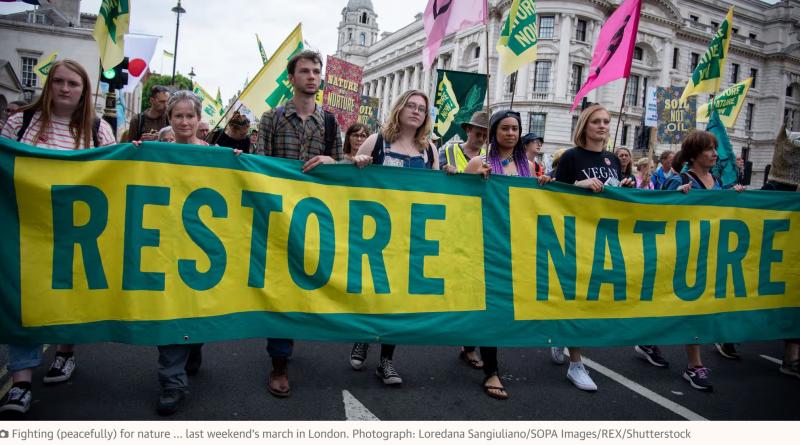The nature march had a huge turnout – so why didn’t it make bigger news?

When Just Stop Oil covered Stonehenge with orange cornflour last week, Keir Starmer was called upon to decry the act, which he dutifully did, even though anyone with even a very slight knowledge of geology will know that the marks won’t last. But that wasn’t what the Labour leader was being asked. Rather, the question was whose side was he on, between “respectable” people and disruptive ones?
A respectable person, who cares about the environment – and this, in theory, is all respectable people, because to not care about the survival of everything you love would make you unhinged – shouldn’t throw things in protest, they should peacefully march. Happily, they did: 100,000 of them at the weekend, fighting for nature. It made some news reports; it didn’t make the bulletins. No radio host gave over their phone-in to the question of whether or not this sort of thing should be allowed. This is the new conundrum of public protest; the only way to be talked about is if you’re demonised. Grab yourself a “hate march” moniker because one person got arrested, and you’ll get all the coverage of your wildest dreams, but it will be unjust, because that one person was actually a counter-protester, and there are more arrests at your average football match.
Without that, though, your protest will leave no ripple, so you’d be much better off throwing some soup at a Van Gogh, which will whip up outrage for months, even though there was glass covering it, and it’s really no big deal.
Hannah Arendt posited that authoritarian governments love sparking protests, because they create the spectacle of the “ungovernable other” which justifies ever harsher government. People discussed that a lot directly after Trump was elected in 2016 – when women took to the streets, all over the world, wasn’t that just giving him exactly what he wanted? Did the crocheted vulva hats keep him awake at night? Or was he somewhere between unperturbed and triumphant?
Everything, from peaceful protest to direct action, has the same purpose: in the face of a peril or outrage that’s important, do something. Don’t do nothing. The more it annoys people, the more attention they’ll pay, and we can argue for ever over whether negative attention is worth more, less or the same as positive attention. But just as an aside to news creators everywhere, when you prioritise the destructive over the peaceful – even just to heap noisy shame upon it – you’re proving what you decry: that orange flour is the only way to get noticed.






